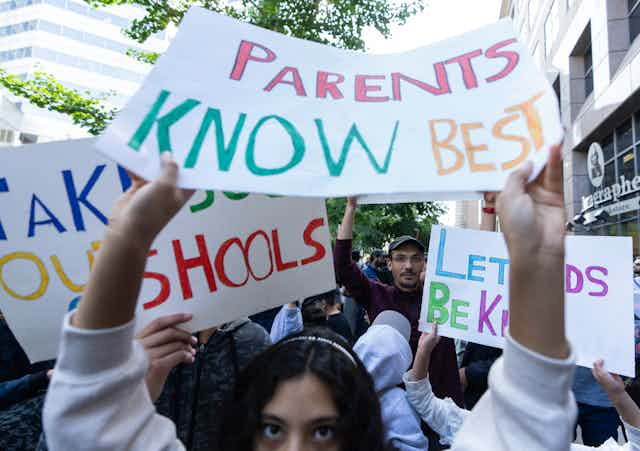Thousands of protesters and counter-protesters in cities across Canada have clashed over the rights of trans children and youth. The “1 Million March 4 Children” on Sept. 20 is part of a widespread and growing “parental rights” movement targeting inclusive public education.
This movement has already influenced provincial politics in Canada, including via Policy 713 in New Brunswick, where youth under 16 years of age are now required to obtain parental consent before they can change their name and pronouns at school.

In Saskatchewan, Premier Scott Moe plans to introduce anti-trans legislation this fall. Faced with legal challenges, Moe has stated he will use the notwithstanding clause to override the Canadian Charter of Rights and Freedoms that prohibits discrimination based on gender identity and expression.
What is the so-called parental rights movement? Some mainstream analyses suggest it’s simply a group of united parents who are invested in their children’s education.
But we debunk this misinformation by offering a brief history of the origins of the parental rights movement and some of its key organizers.
Old idea made new
The parental rights movement is not new.
In the 1970s, conservative activists, including American musician Anita Bryant, used the rhetoric of parental rights and “protecting children” to oppose protections for lesbians and gay men against discrimination in housing, public accommodations and employment.
Speaking at a public hearing on the issue, Bryant proclaimed:
“Homosexuals cannot reproduce — so they must recruit. And to freshen their ranks, they must recruit the youth of America.”
Bryant went on to establish the Save Our Children organization, one of the groups behind the 1978 Briggs Initiative that targeted hundreds of gay teachers in California schools.
Around the same time, parental rights rhetoric was also used to stoke fear around feminist and civil rights gains, including abortion access and racial integration of schools.
Who’s behind the movement now?
Today, the parental rights movement is fuelled in the United States by Moms for Liberty.
According to the Southern Poverty Law Centre, Moms for Liberty is an anti-government and right-wing extremist organization with ties to white nationalists, including the Proud Boys.

One of the organization’s strategies is to see their members elected to school boards, where they subsequently oppose inclusive curriculum and advocate for book bans. As of July 2023, the group had more than 258 chapters in 45 states.
Groups like Action4Canada have taken up the parental rights torch in Canada. They’re calling for the end of inclusive curriculum and restricting the use of chosen names and pronouns in schools.
Far from a group of concerned parents, Action4Canada functions as a highly organized and strategic lobby group — they claim that changes to Policy 713 were a direct response to their lobbying efforts.
According to research by the Canadian Anti-Hate Network, parental rights mobilizations have coincided with the rise in anti-2SLGBTQIA+ policies and platforms of major political parties in Canada, most recently the Conservative Party of Canada and provincial Conservatives in Manitoba and Ontario.

Joining forces in Canada
Organizers of the 1 Million March 4 Children are less cohesive than other parental rights groups, but just as dangerous.
Two groups organized national marches: Family ❤️ Freedom and Hands Off Our Kids.
Family ❤️ Freedom says it’s a secular group that is inclusive of 2SLGBTQIA+ people. Hands Off Our Kids is explicitly religious and anti-2SLGBTQIA+.
Family ❤️ Freedom targets educational sexual orientation and gender identity resources that can be used to help educators make their schools and classrooms safe and inclusive for 2SLGBTQIA+ students. Hands Off Our Kids (a moniker clearly meant to evoke grooming and pedophilia) is protesting “LGBTQIA+ ideology” in schools.
By joining forces, they aimed to convince Canadians with their combined messaging that kids need to be protected from the influences of “woke ideologies.”
The notion of “protecting children” has become a big tent that attracts a wide range of right-wing extremists, religious conservatives and conspiracy theorists. Those drawn to these movements are often responding to their own perceived disenfranchisement.
They hold beliefs that minority groups are undeservedly privileged and they’re trying to “take back” what is rightfully theirs. At this moment, 2SLGBTQIA+ children and youth are being used as scapegoats for a variety of social, cultural, political and economic grievances.
How to take action
2SLGBTQIA+ children and youth are being targeted by hate-motivated extremism under the guise of parental rights, and there are several concrete actions Canadians can take to combat this movement.
2SLGBTQIA+ youth’s voices and lived experiences should be amplified — especially at a time when adults are keen to speak over them. Networks of solidarity are key forces of critical social change, and youth need to see adults standing alongside them in this fight.

Actions can be simple. Individuals, or the organizations they’re involved in, can advocate for the importance of using chosen pronouns and names. This small measure will have incredibly positive impacts on the lives of 2SLGBTQIA+ people, especially children and youth.
Advocacy can also involve organizing or amplifying counteractions to the parental rights movement. In terms of the 1 Million March, counter-protesters rejected bigotry with love, organizing under phrases like “No Space For Hate” and “1 Million Voices for Inclusion.”
Parents clearly want to be involved in their children’s education. However, aligning with the parental rights movement will not increase parental involvement in school. This movement isn’t about enhancing education or protecting children — it is a conduit for right-wing extremism that will only serve to harm 2SLGBTQIA+ youth.

